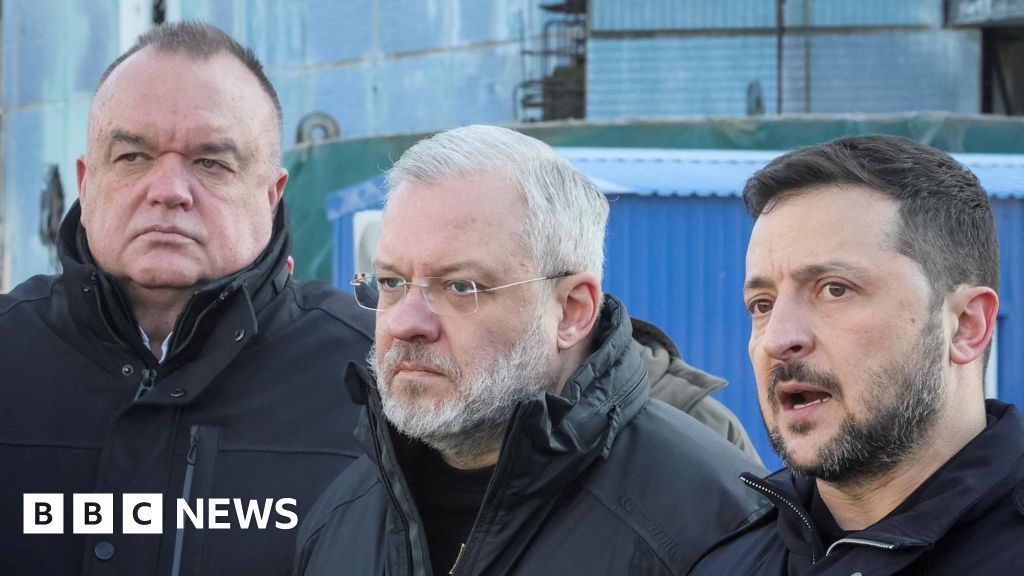Ukraine Corruption: Zelensky Allies & Ministers Resign Amid $100M Embezzlement Probe in Energy Sector
 Ukraine
Politics
Ukraine
Politics

Ukraine's Energy and Justice ministers resigned after President Zelensky called for their removal amidst a $100M energy sector corruption probe implicating alli
Ukraine Rocked by Massive Energy Sector Corruption Scandal; Top Ministers Resign
Ukraine's political landscape is once again embroiled in a significant corruption scandal, leading to the resignations of the country's Energy Minister, Svitlana Grynchuk, and Justice Minister, Herman Halushchenko. The resignations followed a direct call for their removal by President Volodymyr Zelensky, coming in the wake of an extensive investigation into a $100 million embezzlement scheme within Ukraine's vital energy sector.
Allegations of a $100 Million Embezzlement
Anti-corruption bodies initiated a probe revealing a sophisticated scheme to embezzle approximately $100 million (£76 million) from the energy sector. A significant portion of these illicit activities is alleged to have occurred at Enerhoatom, the national nuclear operator. The investigation suggests that key figures, including Justice Minister Herman Halushchenko, along with other high-ranking officials and ministers, received illicit payments from contractors. These contractors were ostensibly involved in building critical fortifications designed to protect Ukraine's energy infrastructure from persistent Russian attacks. Both Halushchenko and Grynchuk have denied any wrongdoing, with Halushchenko vowing to defend himself against the accusations.
Zelensky's Allies Under Scrutiny
The scandal takes a particularly sensitive turn as some individuals implicated are current or former close associates of President Zelensky. Among those named are Oleksiy Chernyshov, a former Deputy Prime Minister, and Timur Mindich, a prominent businessman and co-owner of Zelensky's former TV studio, Kvartal95. Mindich has reportedly fled Ukraine since the allegations surfaced, raising further questions.
Deep Dive into the Investigation
The National Anti-Corruption Bureau of Ukraine (Nabu) and the Specialised Anti-Corruption Prosecutor's Office (Sap) have spearheaded a painstaking 15-month investigation. This extensive probe involved the analysis of over 1,000 hours of audio recordings, ultimately uncovering the systematic participation of several Ukrainian government members. Nabu asserts that those involved routinely collected kickbacks from Enerhoatom contractors, amounting to a substantial 10% to 15% of the total contract values. Evidence presented by anti-corruption bodies includes photographs of large sums of cash, suggesting elaborate money laundering operations. These ill-gotten funds were allegedly transferred outside Ukraine, with some even reaching Russia. Prosecutors have linked the laundering of proceeds to an office in Kyiv, reportedly tied to the family of Andriy Derkach, a former Ukrainian lawmaker now serving as a Russian senator. Nabu continues to release new details and wiretap excerpts daily, promising further revelations.
Broader Implications for Ukraine's Anti-Corruption Fight
This latest scandal unfolds amidst the grim backdrop of intensifying Russian assaults on Ukraine's energy infrastructure. It also casts a critical spotlight on Ukraine's ongoing struggle with endemic corruption, a challenge that persists despite the dedicated efforts of Nabu and Sap over the past decade. The country's commitment to tackling corruption is crucial for its aspirations, particularly its coveted status as an EU candidate country, which was granted on the condition of a credible fight against illicit practices.
A previous crisis in July saw nationwide protests erupt when legislative changes threatened to curb the independence of Nabu and Sap. Kyiv's European partners, including ambassadors from the G7 nations, expressed "severe alarm," prompting President Zelensky to reverse the decision and reinstate the bodies' freedom. While that move quelled immediate unrest, some critics questioned Zelensky's unwavering commitment to anti-corruption reforms. The current scandal now threatens to reignite those concerns and pose more difficult questions for the Ukrainian president regarding the integrity of his administration.